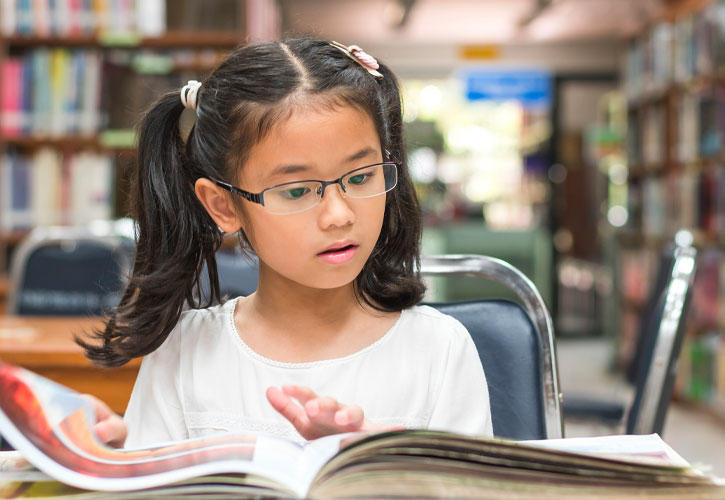Literacy. It’s a word that brings to mind small children sounding out words from a Dr. Seuss book. But what happens to those young enunciators who grow into tweens and teens and lose their enthusiasm?
To Dr. Caitlin Murphy, assistant professor of adolescent literacy, that is a problem that calls for a completely different approach—one that may call for teachers and students to look beyond the page. “You have picture books and journals,
but you also have to have media literacy. That means you are able to assess an argument or point of view,” she says. “I view literacy as a social practice. It’s not something we have, but something we do.”
“When you have a more expansive understanding of literacy, you have more inclusive classrooms.”
A lot of the problem with a lack of interest among older students comes down to content, not necessarily mechanics—although teachers still encounter students who are years out of elementary school and still don’t have the basics down. “Reading
instruction was kind of glossed over in middle and high school—the expectation was that students would know how to do it already,” Murphy says. “But those teachers deal with student reading struggles too.”
To help combat literacy challenges at all levels, Bellarmine University’s Master of Arts in Education (MAEd) in Literacy Specialist program helps educators at all stages of their career deepen their knowledge of literacy practices—and, upon passing of the state Praxis exam in the content area, earn a K–12 literacy endorsement. Along with courses on linguistic development
of emerging and developing readers, diagnostic assessments and corrective interventions for students struggling to learn, teacher students study techniques for teaching comprehension and writing development.

This also helps instructors who aren’t necessarily English teachers think differently about literacy across content areas—making the program indispensable for other educators: non-ELA teachers, literacy coaches and interventionists, and
current and potential administrators.
The curriculum empowers educators to lead—but of course, any teacher will tell you that half the battle of getting students engaged in any topic is allowing them a voice and a choice. “You can explore the life experiences they have had
and still meet standards,” says Murphy, citing the art that students are already learning from. She notes that Beyoncé’s Lemonade video album is a form of social commentary that students soak up, whether consciously or not.
“Why can’t we read beyond?” she asks.
"...any teacher will tell you that half the battle of getting students engaged in any topic is allowing them a voice and a choice."
“Why limit students to learning in the same way? This is [teaching students] critical thinking and the ability to read all sorts of things—memos, billboards, their boss’ mood—and think in a more expansive way about the world.”
Murphy is also moved by the way even middle and high school students have responded after immersing themselves in the questions surrounding the circumstances of Breonna Taylor’s murder. “We can move literacy into activism,” she
says. “That’s really profound.”
With so many new teachers graduating into an increasingly multicultural and multiracial society and coming to teach a classroom unlike the one they experienced personally growing up, the need for a culturally relevant pedagogy is more critical than
ever. “Our system of school is built on white, middle-class values,” points out Murphy, a former high school English teacher. “We know the kids we teach, so we should bring in literature that speaks to them. Take Othello—it’s
about interracial marriage. The assumed love triangle. Kids want to talk about that. This what it means to be equitable—it means being more inclusive so students see themselves. When you have a more expansive understanding of literacy, you
have more inclusive classrooms
“Don’t throw out the classics — do it better.”
This may sound intimidating to an emerging literacy teacher, but knowledge is power. “Pre-service teachers wonder about [how to approach controversial subjects],” Murphy says, stressing the importance of discussing any potentially sensitive
texts with one’s principal. “We have an objective to support our students’ humanity, wholly and fully, once they walk out the door. That doesn’t stop.”
Recognizing humanity and life away from the classroom (or, these days, the computer) is perhaps the biggest part of being an effective teacher; it’s what the students leave with and take out into the world. “I teach the teachers things
I wish I’d known,” Murphy says. “It’s about harm reduction, to help grow teachers who love their students and support them.
“I would have liked to do something like this for my Rank I—it’s a balance of more deep reading instruction, but let’s think about literacy as a social practice,” Murphy says. “My goal is to fill schools with
teachers who can change it from within. It’s the work we are called to do.”
The Master of Arts in Education in Literacy Specialist program
is available to education professionals as a 12-course, 36-hour full-degree sequence. It is completely online and asynchronous. And, for teachers in Jefferson County who had a taste of deep literacy learning through the JCPS Bellarmine Literacy
Project, there is good news: Up to four classes (12 hours) in the project have a direct correlation to courses taught in the Literacy Specialist program, allowing BLP veterans to count that coursework toward their degree, saving time and money
as they pursue the MAEd.